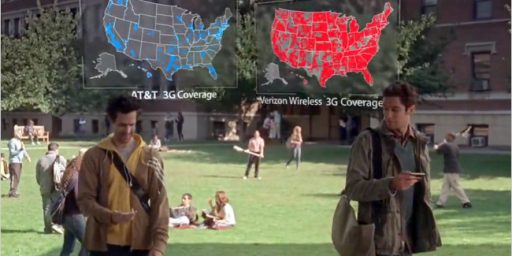PHONE PRICE WARS II
David Bennahum has an interesting piece in Slate about a new piece of software that may finally lead to the mainstream realization of telephony:
For those of you who haven’t heard of Skype, the latest white-hot Internet technology and new social phenomenon, here’s what you need to know: It’s a free piece of software (of course!) that you can download to your PC; suitably armed with speakers and a microphone, you’ll then be able to “call” and talk to anyone else in the world who’s on Skype. In the less than two months it’s been available, 1.6 million people have downloaded the software, setting a world record for this kind of thing.
For a variety of reasons he explores, he thinks Verizon in particular is going to be in a lot of trouble.
The piece also expands on the impact of cell number portability that I mentioned a few days ago:
The wireless telephone business is a savage industry, where acquiring a new customer can cost $300 per person once you factor in the subsidy for the phone, which is usually sold well below cost, and the marketing and promotion efforts that got you to walk into the store. And things are about to get worse. After years of prevarications, appeals, and foot-dragging by cell phone companies, on Nov. 24 the carriers are being forced to let you change your cell phone provider while keeping the same phone number, and they’re supposed to complete your request within 2 1/2 hours.
Who wants to switch? Some analysts estimate that 9 million people will switch carriers on the first day of number portability. As the nation’s biggest wireless carrier, with 32 million subscribers, Verizon could suffer the most losses. Inevitably, number portability is going to trigger a price war. Consumers who shop around should expect dramatic drops in their wireless bills, possibly down to what’s common in Europe: 10 cents a minute, anytime, with no contract. But what’s good for consumers is potentially disastrous for Verizon, which has spent billions of dollars building its wireless network–the nation’s largest–at a cost it has yet to recoup.
Wow. Interesting.
What’s particularly odd to me is that, with an amazing array of competitors, the U.S. market still produces higher cost for this particular commodity. Especially strange since, before the breakup of AT&T, Americans were paying far, far less for land line telephone calls than were the Europeans (or, at least the Germans). Indeed, I’m pretty sure that’s still the case.






James, I don’t wake up in the morning and think of things to be contrary about but somehow I manage.
As far as Skype goes, that is hardly new technology. It has been available in various flavors for years. Apple computer has a version that even does live video, they give it away free and have for months. Maybe it is a new fad but not new technology by any means.
I “attended” the Apple’s developer conference via a friend of mine with a Powerbook and a camera on top. I had the video up on one monitor while I used the other.
Consumers who shop around should expect dramatic drops in their wireless bills, possibly down to what’s common in Europe: 10 cents a minute, anytime, with no contract.
God I hope not… I pay 3.999 cents a minute any time with free long distance roaming et al. I have not paid 10 cents a minute for over 7 years. And I pay this to Verizon and have for the last year or so. Before that, I paid them 4.999 c/m for about 5 years.
I’m not sure what Bennahum is trying to prove, but I don’t think he did it.
There’s a difference between the existence of a technical capability and an easy way for non-techies to use it, I guess.
Most of the cell prices I’ve seen are virtually free if you call in the middle of the night or on weekends. But the 39.99 plans are usually virtually useless for serious use. Verizon’s current plans (link) only give you 400 “anytime” minutes for the national plan you describe. And, of course, the plan isn’t really $39.99–more like $50 once they get through with all the bogus add-ons.
Still, it’s true that it’s a bit under 10 cents a minute.
Trust me.. If Apple computer does it, ease of use was a priority. Heck, it comes preinstalled on the new machines and the microphone if built in. All you have to do is double click and start talking. What we have in the case of Skype is a bunch of kids who use Kaaza jumping on a fad.
Like many companies, the price on the web site and the price you pay at Verizon, are two different numbers. I have 1000 any times minutes for that price with free everything. (long distance, voice mail et al)
There is a company in town that is unlimited cell time for $150 bucks. I agree portability will lower prices further but the guy writing this is delusional if he thinks 10 cents a minute would be a “dramatic drop” in pricing.
Europe wireless is “cheaper” because the countries are
smaller and the cells are government subsidized.
Israel for instance has very cheap cell service but the entire
country is only slightly larger than New Jersey and they’re
paying for that infrastructure with taxes instead of per minute fees.
Mel,
Yeah, that makes sense. Although, ironically, their government run regular phone service was (is?) exhorbitantly expensive.
Around these parts you can get unlimited local and in-state calls (including Memphis) for $49.95 per month (CellularSouth). And my Sprint PCS package (500 peak/1000 off-peak with free nationwide roaming, long distance, and free analog roaming) is $45/month.
Then again, I’m of the mind that if you spend more than 500 minutes a month on the phone something must be wrong with you 😉
Yup. Most of the major European wireless companies are owned by the government, and very heavily regulated, which for the most part is the only reason they’re successful. Few of them have the balls to attempt the actually competitive US market, with the obvious exception of T-Mobile (owned by the German government).
As far as voice-over-IP, I’ve seen it done various ways since at least 1992. There are three deal-breakers: you need a computer with internet access, you need a headset of some sort, and you either can’t call normal phones at all or you have to pay to be able to. Even if you use a PDA and WiFi it’s still clunky and has very limited range. It’s no threat to cellphones, and in fact I think high-speed data over cell will eventually eat WiFi’s lunch for at least the “public third place” types of apps that WiFi’s popular for now.
You get much wider coverage with a cell tower than you do dropping a LinkSys and a DSL router into a Starbucks (roughly 5 miles vs. a few hundred feet under ideal conditions), and the cell tower can recoup it’s costs from both phone and laptop users.
Chris,
That sounds about right. I’d like to do cell as my only phone and we’re about to that point. But if 500 minutes a month–including incoming–is enough for you, there’s obviously no woman in your life!
Ipn order to succeed I think the cellular industry needs to concentrate on delivering actual working service instead of all these crappy gewgaws. I’d happily sacrifice data capabilities, fancy java-enabled phones, whatever… if the damn thing actually did what it’s supposed to, namely make and receive calls with good audio clarity, no reception dropouts, etc.
Yeah, yeah, I know, cell phones “work great for me”–but they don’t work well for me and an awful lot of other people. There’s absolutely no way I can use any cell phone out of my house; I’ve tried all the carriers around here and the signal reception is simply too poor to be usable. (To give you an idea, I get choppy/dropped calls when standing out on the sidewalk, and there’s about a two-block dead zone around my house. Typical signal strength is 1-2 bars. I’ve tried many phones, many providers, all about the same.)
Cell phones are just peachy if I’m standing around in many areas of downtown SF–not sure how that’s useful to me since I don’t spend much time there, but just an amusing data point.
WiFi in terms of generic universal Internet access could happen but probably won’t. It’d cost a ton of money to get the infrastructure in place; look at what happened to Ricochet, and it’s a wider-range deal than WiFi. But there are some advantages to doing it that way, namely that a consumer could easily buy a wireless modem and take it home, sign up for service, and voila! it “just works” with no additional wiring or other installation. Cellphones have a huge advantage in that the infrastructure is partly in place.
James, you’ve outed me. Ah, the swinging ABD bachelor lifestyle!
—